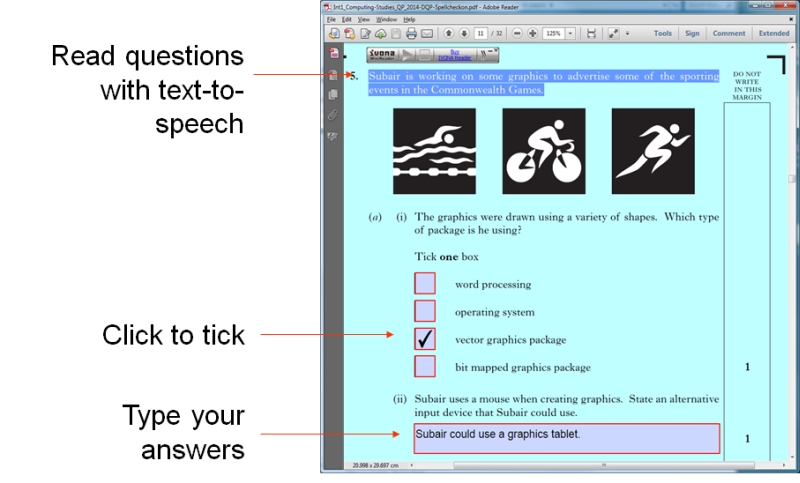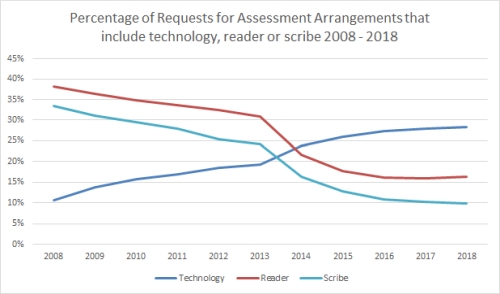Teachers can use papers provided by Qualifications Scotland (previously SQA) and/or create their own assessments to gather evidence of attainment. We are writing a series of blogs on the use of technology for internal assessments assessments to try and answer the common questions that we get asked by teachers, parents and students. We will add more blogs as they are written, so check back here. We are also updating our Digital Assessments web site with information on technology-based support during assessments.
Dyslexia Scotland have published an excellent video workshop by Dawn Roberts and Innes Roberts on the use of assistive technology in assessments, and more broadly. The video is well worth a view if you are a teacher, parent or student using digital technology in assessments this term.
How to Divide and Edit SQA Question Papers 3 May 2021.
A teacher called us to ask how to split up SQA question papers because they need to separate out sections to use in classroom assessments. This blog has some hints and tips.
What are Digital Question Papers?
Digital Question Papers are digital versions of Qualifications Scotland (previously SQA) National 5, Higher and Advanced Higher exam papers. They are designed for students with disabilities or additional support needs who have difficulty using the ordinary paper exam papers.
Students can read the paper on computer or tablet, zoom in to make the text larger, change the colours to reduce glare or increase contrast, and use text-to-speech software to read the questions.
Papers in 'question and answer' format have red answer boxes into which candidates can type - or dictate, with speech recognition - their answers. For the 'question only' papers, candidates can type or dictate into Digital Answer Books.

Digital Question Papers were piloted and then introduced by SQA in 2008. They have been a huge success and are now used by more than half the schools in Scotland. Feedback and research shows that the technology provides a more independent method of support than human readers and scribes, and that it is also more efficient and cheaper for schools because fewer staff and few rooms are required. As a result, the use of technology and digital papers is now a more popular method of support than human readers and scribes in examinations in Scotland.

For more information, visit our Adapted Digital Exams web site.
- Technology-based Assessment Arrangements for SQA 2020-21 Assessments. 14/12/20
All National 5, Higher and Advanced Higher assessments are now going to be assessed by schools and centres internally. What does this involve for learners with disabilities or additional support needs who use technology to access learning? - Technology-based Assessment Arrangements - Internet Security. 14/12/20. How can we manage and administer digital assessments for National 5, Higher and Advanced Higher in 2021? Can we use cloud-based tools such as OneDrive or Google Classroom?
- Technology-based Assessment Arrangements - Which Digital Formats? 15/12/20.
Which digital formats should we use for our internal National 5, Higher and Advanced higher assessments? - Technology-based Assessment Arrangements - Speech to Text Alternatives to Scribes. 16/12/20.
Modern digital devices all offer free, built-in speech-to-text or computer dictation tools. Can learners with disabilities or additional support needs use these tools for National 5, Higher and Advanced Higher assessments? - Technology-based Assessment Arrangements - Digital Assessments Must be Accessible. 7/1/21.
Digital Assessments must be accessible to all learners including students with disabilities or additional support needs. In this blog we explore what this means and how to create accessible assessments. - Technology-based Assessment Arrangements - SQA Digital Exams on iPad. 13/1/21.
With the latest version of Books on the iPad you can type into answer boxes on SQA Digital Question Papers. Find out how in this blog. - How to read maths with Immersive Reader 27/1/21
- Last Friday a teacher asked if we knew how to read mathematical expressions with Immersive Reader. Here's how it can be done: Accessible Word Templates for 2021 National Qualifications 11 March 2021.
- 2021 examinations have been cancelled and teachers and lecturers are devising their own assessments to gather evidence of attainment. We have updated pages on the Digital Assessments web site with information and advice and some downloadable templates to help practitioners create accessible assessments.
- SQA 2021 Assessments and beyond - an Insight into Using Technology 29 April 2021.


Our social media sites - YouTube, Twitter and Facebook